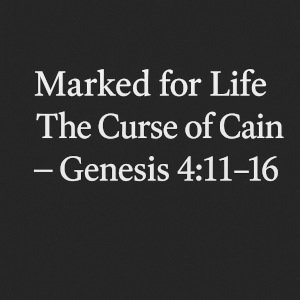Marked for Life: The Curse of Cain – Genesis 4:11-16.
In the early pages of the Bible, we witness a moment that forever shapes the human story: the first murder, the first curse, and a mysterious mark from God. Genesis 4:11–16 tells the story of Cain and his devastating choice to kill his brother Abel. But it’s not just a tale of crime and punishment. It’s a deeply layered message about justice, mercy, guilt, and how God responds to brokenness.
This ancient story still echoes today. Why? Because like Cain, many of us walk through life carrying things we cannot undo—yet still long to be seen, forgiven, and even protected.
Table of Contents
The First Bloodshed
Cain and Abel, the sons of Adam and Eve, both brought offerings to God. Abel’s was accepted; Cain’s was not. In a fit of jealousy and pride, Cain lured his brother into the field and killed him.
This wasn’t just the first act of violence—it was a rejection of responsibility, relationship, and reverence. When God asks Cain, “Where is your brother Abel?”, Cain replies with the chilling words:
“Am I my brother’s keeper?” (Genesis 4:9)
God then declares that Abel’s blood cries out from the ground. The earth itself bears witness. Cain is cursed—not only from God but from the land that once sustained him.
The Curse of Cain
“Now you are under a curse and driven from the ground… You will be a restless wanderer on the earth.”
— Genesis 4:11–12
This curse is both physical and spiritual. Cain is cut off—from his homeland, from his family, from the stability of belonging. But even in this just judgment, we see something deeper begin to unfold.
Cain panics. Not because he is sorry—but because he fears for his life. He says:
“My punishment is more than I can bear… whoever finds me will kill me.” (Genesis 4:13–14)
Here’s where the story takes a turn that most people overlook.
A Mark of Mercy
Rather than allow Cain to be hunted and killed, God responds with surprising compassion:
“But the Lord said to him, ‘Not so; anyone who kills Cain will suffer vengeance seven times over.’ Then the Lord put a mark on Cain so that no one who found him would kill him.” (Genesis 4:15)
God doesn’t erase the consequences. Cain will still wander. He will still be separated. But he will not be destroyed. The mark God places on him is not a brand of shame—it’s a symbol of protection.
This is one of the earliest examples in Scripture where we see God’s mercy operating alongside His justice. Cain deserved to be cut off. But God ensured he wouldn’t be cut down.
What Was the Mark?
The Bible doesn’t tell us what the mark looked like. Scholars and theologians have speculated for centuries, but the ambiguity seems intentional. The point isn’t what the mark was, but what it meant.
It was a sign that:
- Cain still belonged to God’s creation
- Cain’s life still held value, even in brokenness
- Divine protection was not just for the innocent—but even for the guilty
That’s a hard truth for many, but it reveals something profound about the nature of God.
Marked, But Not Forgotten
The phrase “marked for life” is usually negative—referring to trauma, shame, or permanent failure. But in Cain’s story, the mark becomes something more complex. It represents guilt, yes—but also grace.
Cain leaves the presence of the Lord and settles in the land of Nod, east of Eden. He starts a family. He builds a city. His story isn’t erased—it’s redirected.
That same principle applies to us. We may carry the scars of bad decisions. We may feel the weight of regret. But God’s response is not always destruction. Sometimes, He marks us not to end our story, but to reshape it.
Why This Story Still Matters
Genesis 4:11–16 isn’t just ancient history. It’s a mirror. It asks us hard questions:
- What do we do when we fail?
- Can guilt and grace coexist?
- Will God still protect us—even when we’re the ones who caused the damage?
The answer, surprisingly, is yes.
The mark of Cain is a paradox: a sign of consequence and compassion. It’s God saying, “You’re not off the hook—but you’re not outside My reach.”
If you’ve ever felt marked by your past, remember this:
Being marked doesn’t mean being abandoned.
Sometimes, it means you’re still part of the plan.

P.S. If this message spoke to you, don’t miss what’s next—subscribe to HolyThreadProject on YouTube for more faith-filled insights and biblical reflections delivered weekly.
#MarkedForLife #CainAndAbel #Genesis4 #BibleStudy #BiblicalLessons #FaithAndMercy #OldTestamentTruth #GodsJustice #ChristianBlog #HolythreadProject
